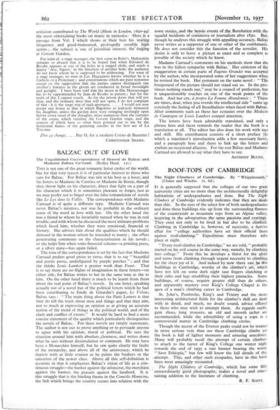BALZAC OUT OF LOVE
The Unpublished Correspondence of Honore de Balzac and Madame Zulma Carraud. (Bodley Head. iss.) THIS is not one of the great romantic letter cycles of the world, "bin for that very reason it is of particular interest to those :who care for Balzac. ' For Balzac was not at his-best as a lover, and his letters to Madame de Castries or Madame de Berny, though they throw light on his character, direct that light on a part of his character which it ii sometimes pleasant to forget, just as we may prefer not to linger over the false romanticism of novels like Le Lys dans la Vallee. The correspondence with Madame Carraud is of quite a different type. Madathe Carraud was never Balzac's mistress, nor was he probably in the ordinary sense of the word in love with her. On the other hand she was a friend to whom he invariably turned when he was in real trouble, and with whom he discussed the most intimate problems which faced him, whether they were emotional, financial or literary. She advises him about the qualities which he should demand in the woman whom he intended to marry ; she offers penetrating comments on the characterisation in his novels ; or she helps him when some financial Schemea printing press, or a silver mine—has again failed.
The tone of the correspondence is set by the fact that Madame Carraud prefers good pro:se to verse, that is to say " beautiful and poetic prose, undisfigured by purple patches " ; and that she thinks Louis Lambert a greater work than Faust. That is to say there are no flights of imagination in these letters—on either side, for Balzac writes to her in the same tone as she to him. On the other hand there is much to be learnt from them about the real point of Balzac's novels. In one letter, speaking actually not of a novel but of the political letters which he had been contributing to Emile de Girardin's paper, Le Voleur, Balzac says : " The main thing about the Pans Letters is that they do tell the truth about men and things and that they aim, not so much at expressing an opinion as at giving an accurate notion of the trend of things in the political world, and of the clash and conflict of. events." It would be hard to find a more concise statement of the quality which particularly distinguishes the novels of Balzac. For.these novels are simply statements. The author is not out to prove anything or to persuade anyone to agree with his opinion, Moral or political. He sees the situation around him with absolute ,clearness, and writes down what he sees without dissimulation or comment. He may have been a Monarchist himself, but he saw quite clearly the faults of the monarchy, and above all of the aristocracy, which he depicts with as little evasion as he paints the bankers or the eRreerists of the newer class. Above. all this self-definition is ' accurate in that it emphasises' Balzac's vision of life as a con- tinuous struggle—the banker against the aristocrat, the merchant against the banker, the peasant against the landlord. It is this struggle that is the binding theme in the Comedie Humaine, the link which brings the country scenes into relation with the IoWn-StorieAsaand-thc Iteroje__events of shg...Reyolution with the Squalid incidents of commerce or journalism after 183o. But, though he analyses this struggle with appalling accuracy, BalZac never writes as a supporter of one or other of the combatant's. He does not consider this the function of the novelist. His desire is only to leave a picture as exact and as complete as possible of the society which he-knew.
Madame Carraud's comments On 'his ethods show that she
Was in the fullest sympathy with Her criticism of the exaggeration in certain parts of Eugenie Grandet was accepted by the author, who incorporated some of her suggestions when he revised the book. Her comment on the same novel : " Tlie foreground of the picture should not stand out so. In the pio- vinces nothing stands out," may he a council of perfection, but it- unquestionably touches on one of the weak points of the book. And her cry, a propos La Femme Abandonnie : " There are times, dear, when you overdo the intellectual side " sums tip concisely the feeling of all Stendhaliens when faced with Balzac. After comments such as these her ecstasies over the Medecin de Campagne or Louis Lambert compel attention.
The letters have been admirably translated, and only a phrase here and there reminds the reader that the book is a translation at all. The editor has also done his work with tact and skill. His contribution consists of a short preface Op which a translator's introduction adds a few necessary fads), and a paragraph here and there to link up the letters and explain an occasional allusion. For the rest Balzac and Madame Carraud are allowed to say what they have to say.
ANTHONY BLUNT,














































 Previous page
Previous page